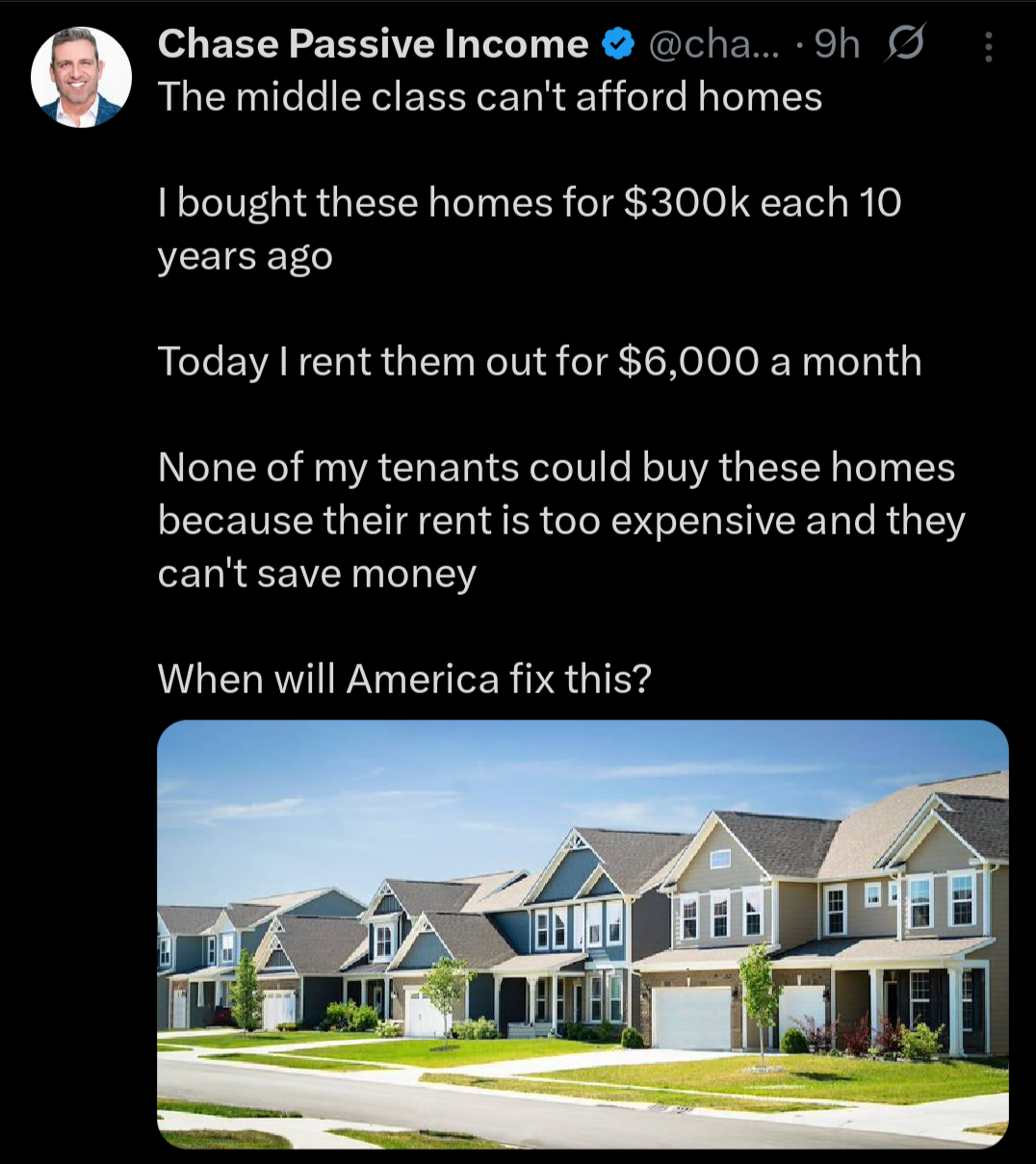this post was submitted on 18 Aug 2025
708 points (99.3% liked)
People Twitter
7955 readers
1079 users here now
People tweeting stuff. We allow tweets from anyone.
RULES:
- Mark NSFW content.
- No doxxing people.
- Must be a pic of the tweet or similar. No direct links to the tweet.
- No bullying or international politcs
- Be excellent to each other.
- Provide an archived link to the tweet (or similar) being shown if it's a major figure or a politician.
founded 2 years ago
MODERATORS
you are viewing a single comment's thread
view the rest of the comments
view the rest of the comments

I can walk into a bank today with a mortgage cheaper than rent, and I’ll be denied cause I don’t make enough money, explain that logic to me.
Landlords don't care if your rent is sustainable for you in the long term. They have nothing to lose if at one point you can't afford it anymore, someone else will.
Banks on the other hand care very much if you'll be able to pay your loan in full. Even with the house as collateral, it's much better for them if you just paid your loan instead of them having to deal with all that.
"they get the house if you don't pay" really isn't so great after you've look at what they actually get for those houses.
Generally, people don't get foreclosed on when their house looks super fancy and well maintained.
The counter-intuitive solution is probably to make it easier for banks to evict people for not paying their mortgage.
In most of the US, foreclosures are a legal process that requires a court order. The bank has to take the borrower to court, prove the loan is not paid, and then the court has to find in favour of the bank and then issue an order to have the sheriff auction off the property.
In many cases, these auctions will result in the property sold far below market value because the borrower will drag their feet and not co-operate. In many cases, buyers can't do a thorough house inspection and thus the hammer price suffers because they have to account for that risk.
The bootlicker-sounding but actually smart solution, if you consider it beyond the initial knee jerk reaction, is to make it so that when the court enters a foreclosure order, the homeowner is immediately evicted and the house is now in the custody of the State until it is sold. The borrowers can have a reasonable time to leave, but when they do, the sheriff should then open the property to the public for inspection and hire or allow buyers to hire house inspectors, perform title searches, and all the other formalities associated with selling a house in the ordinary manner.
All buyers then submit written offers (bids) to the sheriff like they would for any other house purchase but these bids would be published to avoid accusations of impropriety; the highest bidder gets the house. As with any other auction, the bank bids the amount of the mortgage plus court costs as a baseline. After it is sold, the sheriff takes the traditional 6 per cent estate agent fee for their trouble and then pays off the bank and the remainder goes to the borrower.
As terrible as it sounds for the ordinary borrower, this actually results in a better outcome for them because it would result in a higher sale price for the house, meaning the mortgage is lower risk for the bank by reducing the likelihood that the bank bid is the highest, allowing them to extend those loans to more people, and a defaulted borrower gets more of their money back in the end.
They only get to force the sale of the house to recoup their loan, you get to keep the extra from the sale. House sells for $300k, you owed $250k you walk away with $50k and the bank gets their money back.
But on auction, the bid is usually FAR below the normal asking price.
Also debt is an asset for banks. Having people in debt for 30 years is better than having people in debt for 10 years and then selling their house.